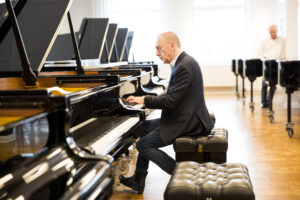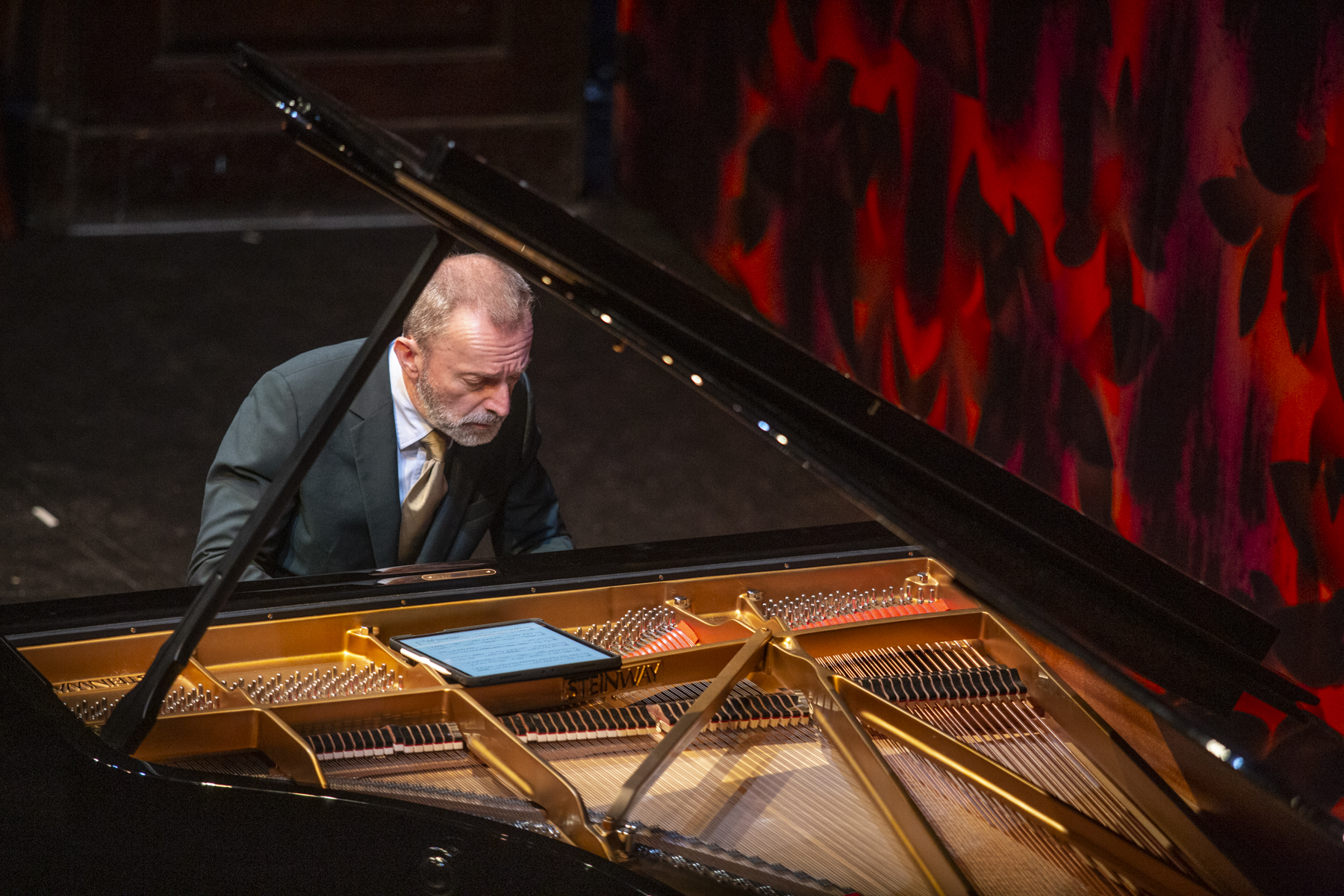A Spoleto regular since 2008, pianist Pedja Muzijevic has consistently captivated Festival audiences from the Dock Street Theatre stage. He is a fixture of the Bank of America Chamber Music series, known for his technical virtuosity and rich artistry, at home in compositions by Haydn, C.P.E. Bach, and Schubert, as well as John Cage and Morton Feldman. Outside of Spoleto, Muzijevic travels internationally for both solo and orchestral concerts, performing this past season with the St. Paul Chamber Orchestra, Chamber Music Society of Lincoln Center, and during the Verbier Festival in Switzerland, among other engagements.
In 2017, Muzijevic was tapped by Spoleto to travel to the Steinway & Sons factory and showroom in Hamburg, Germany, to select the Festival’s new piano—the very instrument that will be played this year during the Bank of America Chamber Music series performances, as well as concerts at the Charleston Gaillard Center and Cistern Yard. In celebration of World Piano Day, and in anticipation of Muzijevic’s return to Spoleto, we caught up with the pianist to chat about his instrument.
Spoleto Festival USA: How old were you when you first played the piano?
Pedja Muzijevic: I was fairly old by today’s standards: I started at age 9. My parents were not musicians, so this was my own thing—they didn’t really intervene or insist I practice. I didn’t feel any pressure.
SFUSA: What first attracted you to the piano?
PM: I heard it on the radio or saw it on TV—it’s hard to remember exactly what it was. Growing up in Yugoslavia, I listened to the radio a lot. Turning the knob—I’m dating myself—I could listen to concerts that were broadcast over Austrian radio or Italian radio. I was really obsessed.

Muzijevic at the Steinway & Sons factory in Hamburg, Germany
SFUSA: What continues to resonate with you today?
PM: When music-making evolved from taking place in the church to the courts to aristocratic homes, the piano became the entertainment center of the family—like TV is today. I love that. You can sit down and play a song or a sonata—doesn’t matter exactly what it is, but the piano is a solo instrument. It’s self-sufficient. You don’t have to play with other instruments because the sounds its capable of provide a complete experience. I’d say it’s an embarrassment of riches, though weirdly enough, it took us pianists a long time—until the 20th century!—to reach inside and pluck one of its strings.
SFUSA: What’s one misconception about the instrument—or what’s one pet peeve when you hear people talk about the piano?
PM: When people come to my tiny New York City apartment, they always say, “How did you get this huge thing in here?” They rarely realize you just take off the legs off, turn it on its side, and get it on a dolly. It goes places! I mean, it’s amazing how fast skilled movers can do it. So in that case, anyone can have one! Go get a piano.
SFUSA: You had a hand in selecting the Steinway you play here at Spoleto. Do you still stand by your selection?
PM: Last month, a pianist who teaches at the University of South Carolina played the piano at Festival headquarters, and he contacted me after the concert about how great it sounded. I was so thrilled to get that message. It’s kind of hard to explain—a piano is a factory-produced instrument. Sure, there are artisans involved, but there are really strict guidelines. Still, us wacky people who play can hear and feel different things about each piano. I selected this one from eight others in the showroom, and while they were all fantastic, I’m still amazed at how this piano in particular is so beautiful. It’s certainly aging well.
SFUSA: If you didn’t play the piano, what instrument would be your second choice?
PM: While I play various version of pianos, from the 1780s to modern pianos—and the harpsichord—I don’t how to play another instrument. That said, if I could sing, I’d sing. One’s voice is the original instrument. There are setbacks of course: you can’t sing with a cold. I can still play the piano when I’m sniffling or sneezing.
SFUSA: What are you most looking forward to playing this season at Spoleto?
PM: Certainly this year will be very difficult for all of us, without Geoff Nuttall. The celebration concert on opening night will be so special. In terms of particular pieces: during the first chamber music program, I’ll be playing a Mozart piano quartet, alongside Owen Dalby, Lesley Robertson, and Chris Costanza of St. Lawrence String Quartet. It’s something I’d played a lot with Geoff, so I know it’ll be a really tough moment. Then during program X, I’ll be playing a piano quintet by Amy Beach—a 20th-century female composer from Massachusetts. It can stand up to any piano quintet of the era. And finally, I’m quite excited to play the Silvestrov piece, The Messenger, with the Spoleto Festival USA Orchestra on June 5. This is an evocative, interesting piece. It’s also an homage to Geoff in a way, and certainly a tribute to Ukraine. It’s very beautiful.

